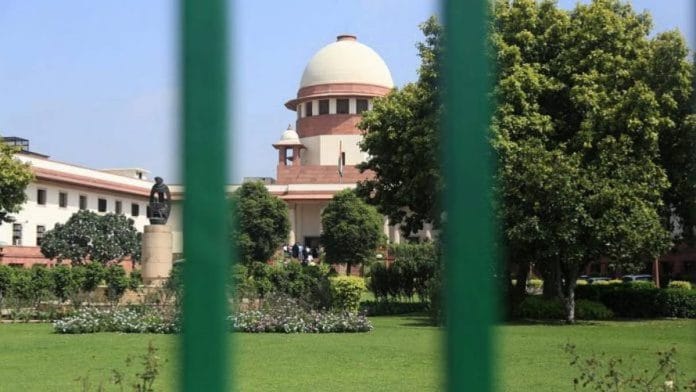New Delhi: The Supreme Court Tuesday directed its registrar (vigilance) to conduct an enquiry into allegations of forgery made by a 94-year-old resident of Bihar, who claimed that the top court recorded a settlement in a decades-old property dispute based on a document he never signed.
Harish Jaiswal, a nonagenarian from Muzaffarpur, alleged that his signature was forged and fabricated documents were submitted to the court to suggest he did not wish to pursue the civil litigation that began in 1986. This was despite Jaiswal having secured favourable orders in both the trial court and the Patna High Court.
On 13 December, the Supreme Court disposed of the appeal filed by Jaiswal’s opponent, Bipin Bihari Sinha, who had challenged the Patna High Court verdict in Jaiswal’s favour. The court relied on a purported settlement agreement submitted by Sinha. Surprisingly, the order also noted the presence of four lawyers, including one senior counsel, representing Jaiswal—despite him not hiring a lawyer for that hearing or filing a caveat.
Upon learning of this, Jaiswal filed an application seeking recall of the 13 December order.
He submitted that he had never signed any caveat, nor had he authorised any lawyer to appear on his behalf.
When the matter was taken up Tuesday by a bench led by Justice P.S. Narasimha, one of the lawyers named in the 13 December order, Shefali Sethi Khanna, denied ever appearing in the matter or knowing Jaiswal. She further informed the court that her father, J.M. Khanna—named as the advocate-on-record for Jaiswal—stopped practising eight years ago.
An advocate-on-record (AoR) is authorised under Supreme Court rules to file cases and related documents. No lawyer is allowed to appear or argue in the court without an AoR, who serves as a link between the litigant and the arguing counsel.
Jaiswal’s current lawyers, Abhishek and Gyanant Singh, drew the court’s attention to a new document filed in the case stating that Jaiswal had not authorised them to submit the recall application. They told the court this document too was forged. This fraud, they said, occurred despite the Supreme Court issuing a notice to the opposite party on Jaiswal’s recall plea. Jaiswal was also present in court through video conferencing.
Sinha and his counsel unsuccessfully opposed the plea to recall the December order, but their attempt failed. Justice Narasimha’s bench, citing the circumstances presented and noting that execution proceedings related to the disputed property were still pending before a trial court in Patna, recalled the earlier order.
The court instructed the registrar (vigilance) to submit a report within three weeks and indicated that a Central Bureau of Investigation (CBI) probe may be ordered based on its findings.
This incident marks the second such complaint of alleged impersonation in the apex court.
In 2023, a similar issue arose in a case involving Ajay Katara, a key witness in the Nitish Katara murder. While Katara had secured relief from the Allahabad High Court, the victim’s father appeared before the Supreme Court and denied authorising any lawyer to file or argue the case on his behalf. The court subsequently ordered a CBI enquiry to probe the conspiracy allegedly designed to implicate Katara.
In his January application, Jaiswal recounted the sequence of events, suggesting a larger conspiracy “designed to unlawfully obtain an order from” the Supreme Court without the rightful party’s participation. “Such blatant abuse of legal mechanisms cannot be permitted,” his application submitted.
The dispute between Jaiswal and Sinha dates back to 1986 and centres around a purported agreement (Mahadnama), under which Sinha claimed to have purchased Jaiswal’s property for Rs 63,000.
When Jaiswal contested the authenticity of the agreement, Sinha initiated legal proceedings to enforce it, claiming full payment had been made. However, the trial court dismissed Sinha’s claim, concluding the agreement was neither genuine nor properly executed. A key witness named in the agreement refused to support Sinha in court, and discrepancies in Sinha’s statements cast further doubt on the document’s authenticity.
The first appellate court upheld the trial court’s verdict, noting Sinha failed to prove that the contract had been lawfully executed. It also found that Sinha had misled the court using “forged and fabricated” evidence.
Sinha’s second appeal before the Patna High Court also failed. Since the case hinged on facts already adjudicated, the High Court upheld the findings of the lower courts in an order pronounced 15 July 2024.
Sinha then approached the Supreme Court, which in December disposed of the case after being presented with an alleged settlement agreement dated October 2024. According to this document, Jaiswal had agreed to hand over possession of the disputed property in return for payment.
However, Jaiswal claimed he became aware of the Supreme Court proceedings only after his son-in-law stumbled upon the 13 December order while researching execution proceedings in civil cases on a legal website. Jaiswal stated that he was “left utterly shocked” to learn that an appeal had been filed and disposed of in his name. He also discovered a caveat had been filed on his behalf without his knowledge or consent.
His application emphasised that eviction proceedings against Sinha are still pending, and Sinha had sought adjournment on the grounds of his wife’s illness. Sinha also failed to disclose to the trial court that he had filed an appeal in the Supreme Court.
(Edited by Radifah Kabir)
Also Read: SC wants a relook at its own 2017 judgement on process of designating senior advocates






